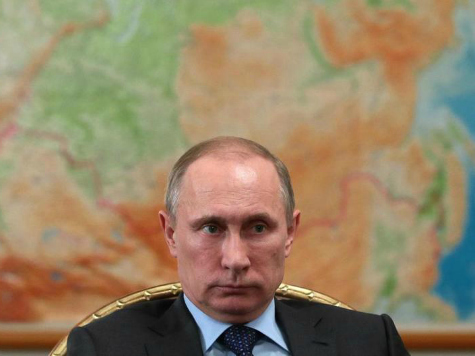
The crisis will not go away. Tuesday, for the first time, a Ukrainian officer was shot and killed by the Russian forces in Crimea. It’s no longer just about posturing and local referendums anymore.
The Prime Minster of the UK, who was lampooned for so long as just a self-promoting Tony Blair in conservative’s clothes, has called for the permanent expulsion of Russia from the G8. If you don’t think America should just sit back, let other nations respond, and at the same time send the powers that be in Beijing or Tehran the message that we don’t care if borders are redrawn by force – then what should be done?
My day job is educating counterterrorism officers, members of the special forces community, and federal law enforcement agents to think strategically. I always tell them the most important thing you can do is the ask the right questions and answer the “So What?” question at the end of the day. So here we go, in a thumbnail sketch, for Ukraine.
What do we know about Russia? It is driven by a corrupt elite and has been for the last hundred years. (Doesn’t matter what they called themselves, Tsarists, Communists, or former KGB colonels.) It acts as a regional bully. Nothing surprising there. Just think about the end of WWII, Hungary in 1956, Czechoslovakia in 1968, or Georgia just a few years ago.
What’s new? Two things: the Kremlin is now prepared to use force to enlarge its national territory, and even neutral states – like Sweden – are afraid and want to join NATO.
So what? Why should we care?
Whatever you think of our “adventures” in Afghanistan and Iraq in the last thirteen years, you can probably agree that it would not be good for America if a full-scale war erupted in Europe. I would add that – in a related fashion – the security of our treaty allies remains important and that we have some interest in the survival of the small numbers of people who live in non-NATO nations that are pro-American.
Subsequently, we need to come up with an objective for our national response that realizes these interests. That’s what being strategic actually means. Given the above, and if we don’t want a shooting match to drag us into another war in Europe, I would argue that America’s mission is to make Russia think twice about its grand plans to expand even further into the West. To do that we have to cause Putin enough pain personally that he decides that after swallowing the Crimea it’s better not to go any further.
To make him do that America should do the following:
- Covertly attack the financial assets of the oligarchs. Putin was a second-rate KGB officer who is only in power because a handful of kleptocrats keep him in power. Hurt them and their off-shore bank accounts in Cyprus and the tanks stop rolling – fast. (We should also finally use our superb cyber potential to attack his government systems, just as NATO’s networks were attacked during the Kosovo campaign.)
- Help the Ukrainian people help themselves. We will not – and should not – deploy US or NATO assets to fight for the independence of the Ukraine. However, the Ukrainians could use a little help. A good friend from an Allied nation has just returned from Kiev, and he tells me that the Ukrainian military is well disciplined and doing everything it can to resist responding to Russian provocations. However, the Ukrainian armed forces have been systematically weakened in recent years by Russia, especially in terms of equipment. Additionally, one of the first things the invading Russian forces did was steal all the encrypted communications code keys, so even if the Ukrainians wanted to fight, they can’t. Instead of giving guns to the jihadis in Syria – who want to kill us too, as well as Assad – we could give radios to the Ukrainians who actually like us and want to be our allies.
- Revitalize bilateral relations with the Central Asian ‘Stans’ – who are hurting from Kremlin- imposed trade association agreements – and promote alternative ways to send all their surplus gas and oil to Western Europe without transiting Russian soil. At the same time launch a pro-fracking campaign in concert with the most Russian-energy-dependent EU and NATO nations. If they actually got going, they could be as oil-and-gas-independent as America could be if we get serious about fracking in the US.
Of course, all of the above would require us having an administration that understands “Big Boys Games” and wants to win.
Sebastian Gorka PhD is Associate Dean and Associate Professor of War and Conflict Studies at National Defense University, Washington, and an Associate Fellow of SOCOM’s Joint Special Operations University.

COMMENTS
Please let us know if you're having issues with commenting.